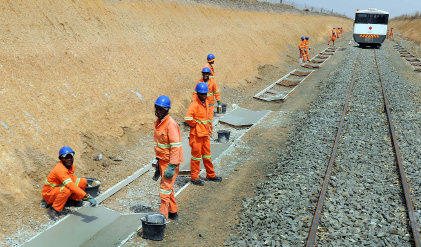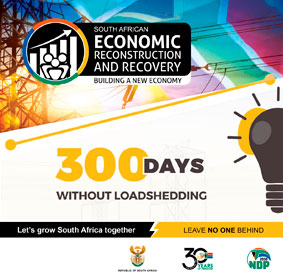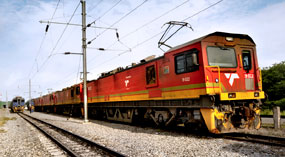Infrastructure
Government wants a nation with a thriving economy that benefits all. To create this virtuous cycle of investment, growth and jobs, it must lift economic growth to above 3%. To achieve higher levels of economic growth, government is undertaking massive investment in new infrastructure, while upgrading and maintaining the existing infrastructure.
 Government is developing innovative ways of funding infrastructure. It is engaging local and international financial institutions and investors to unlock R100 billion in infrastructure financing.
Government is developing innovative ways of funding infrastructure. It is engaging local and international financial institutions and investors to unlock R100 billion in infrastructure financing.
A project preparation bid window has been launched to fasttrack investment readiness. This includes revised regulations for public-private partnerships, which will unlock private sector expertise and funds.
Government will spend more than R940 billion on infrastructure over the next three years. This includes R375 billion in spending by SOEs. This funding will revitalise roads and bridges, build dams and waterways, modernise ports and airports, and power the economy.
Through the Infrastructure Fund, 12 blended finance projects worth nearly R38 billion have been approved in the last year. These are projects in water and sanitation, student accommodation, transport, health and energy.
“Construction of the Mtentu Bridge continues. This bridge will rise above the river between Port Edward and Lusikisiki; and will become the tallest bridge in Africa.” – President Cyril Ramaphosa, SoNA, 6 February 2025, Cape Town City Hall.
The Polihlali Dam will feed 490 million cubic metres of water a year from the Lesotho Highlands into the Vaal River System, securing water supply to several provinces for years to come.
Working with international partners, government is revitalising small harbours and unlocking economic opportunities for coastal communities. It is steadily removing the obstacles to meaningful and faster growth.
Economic reforms
 The economic reforms that government is implementing through Operation Vulindlela have created a new sense of optimism and confidence in the economy.
The economic reforms that government is implementing through Operation Vulindlela have created a new sense of optimism and confidence in the economy.
Government has made progress in rebuilding and restructuring a number of network industries. It is seeing positive results in the improvement of the functioning of network industries as well as the investment opportunities that are opening up and are being taken by investors, leading to job creation.
Working together with business, labour and other social partners government must now finish this work. Over the coming year, it will initiate a second wave of reform to unleash more rapid and inclusive growth.
Reform of public entities
The immediate focus is to enable Eskom, Transnet and other SOEs that are vital to the economy to function optimally. Government is repositioning these entities to provide worldclass infrastructure while enabling competition in operations, whether in electricity generation, freight rail or port terminals.
Government continues with the fundamental reform of SOEs to ensure that they can effectively fulfil their social and economic mandates. This includes the work underway to put in place a new model to strengthen governance and oversight of public entities.
Government will ensure public ownership of strategic infrastructure for public benefit while finding innovative ways to attract private investment to improve services and ensure public revenue can be focused on the provision of public services. It is in the process of establishing a dedicated SOE Reform Unit to coordinate this work.
Energy
The measures we have implemented through the Energy Action Plan have reduced the severity and frequency of load-shedding, with more than 300 days without load shedding since March 2024.
“While the return of load-shedding for two days last week was a reminder that our energy supply is still constrained, we remain on a positive trajectory. We now need to put the risk of load-shedding behind us once and for all by completing the reform of our energy system to ensure long-term energy security.” – President Cyril Ramaphosa, SoNA, 6 February 2025, Cape Town City Hall.
The Electricity Regulation Amendment Act, 2024 (Act 38 of 2024), which came into effect on 1 January, marks the beginning of a new era. This year, government will put in place the building blocks of a competitive electricity market. Over time, this will allow multiple electricity generation entities to emerge and compete.
Government will mobilise private sector investment in the transmission network to connect more renewable energy to the grid. As government reforms the energy system, it is continuing to build successful multilateral partnerships in the global effort to halt the devastating impact of climate change. South Africa’s Just Energy Transition is gaining momentum.
Over 13 billion US dollars have been pledged by the international community and significant private capital is being invested locally. Government is determined to meet the carbon reduction commitments, and will do so at a pace and scale that the country can afford.
Freight Rail System
 Government is revitalising port terminals and rail corridors through the Freight Logistics Roadmap, leveraging private capital to restore them to world-class standards. Transnet’s performance has stabilised and is steadily improving.
Government is revitalising port terminals and rail corridors through the Freight Logistics Roadmap, leveraging private capital to restore them to world-class standards. Transnet’s performance has stabilised and is steadily improving.
Government released a Network Statement in December 2024 which, for the first time, will enable private rail operators to access the freight rail system. Open access to the rail network will allow train operating companies to increase the volume of goods transported by rail, while the network infrastructure remains state owned.
This will ensure that South African minerals, vehicles and agricultural produce reach international markets, securing jobs and earning much-needed revenue for the fiscus.
New cranes and other port equipment are being commissioned to speed up the loading and unloading of cargo and reduce waiting times for ships in the ports.




